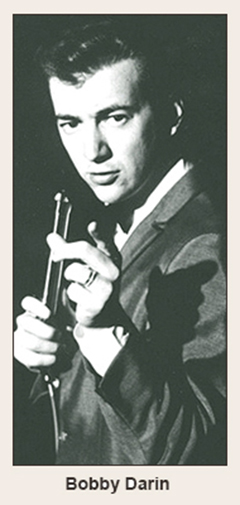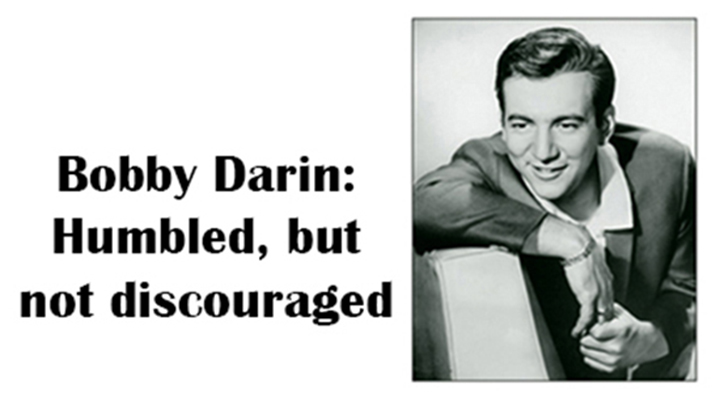Akron Beacon Journal, February 26, 1967
| “I want to establish myself as a legend by the time I’m 25.” |
| – Bobby Darin, 1959 |
By JACK MAJOR
No matter what people think of Bobby Darin, they all agree on one thing – Bobby-boy has a big, fat mouth.
Even Darin agrees on that.
That’s what make him so lovable – like Muhammad Ali, Howard Cosell, Joyce Brothers, Richard Nixon and William F. Buckley Jr.
And as one of the Lovables, Darin finds himself target of much criticism ... and, inevitably, much misunderstanding.
DARIN CALLED the Beacon Journal last week to plug Thursday’s “Stage 67” presentation, “Rodgers and Hart Today.”
The program is intended to show how the music of Richard Rodgers and Lorenz Hart is alive and vital today, and the proof will be in the performances of contemporary artists such as Darin, Petula Clark, the Doodletown Pipers, the Supremes, and the Mamas and Papas.
So Darin got that bit of business out of the way first.
“I’m not sure if the program comes together,” he said, “but, then, I’m not sure it’s supposed to. The fact is the program is just 60 minutes of great music. There isn’t a word of dialog in it.”
Thus there’s no long narration about the lives of the composers, nor is there an attempt to wrap the program in a neat little ball at the end an say, there, didn’t we prove our point? And that’s what Darin meant by “comes together.”
WITH THAT out of the way, Darin opened discussion of his favorite subject – himself.
In the past Darin’s candor and confidence – okay, his cockiness – hurt his image. That statement about becoming a legend came back to haunt him. It’s safe to say many familiar with Darin were delighted when the singer’s career stalled in the 1960s.
Darin, now 30, is still candid and confident, but easier to take. Age has mellowed him a bit.
“I can say, okay, I didn’t make the legend. But if I were 23 again, I’d still say it. And I’d still mean it.”
DARIN’S TROUBLE – and it’s something that bothers others more than it does him – is he sees nothing wrong with being forthright.
“I don’t try to hide anything. We all set goals for ourselves, aiming for what we want to achieve in life. Therefore we follow our own ambitions. It happens that mine are high.”
Darin’s open-mouth policy earned him bad publicity, especially in the early ‘60s when he was still considered, essentially, a teenage idol. Few grown-up writers seemed ready to accept the cocky kid as the next Frank Sinatra.
That bad publicity has faded, and so has Darin’s popularity.
“I HAVE re-evaluated my talent and my career,” he said. “The biggest disappointment has been in my movie career. I’ve made a lot of mistakes.
“I’m really only proud of my work in ‘Pressure Point’ and ‘Captain Newman.’ Significantly, those are the only two pictures I chose for myself. The others I had to do as part of a contract I signed many years ago.
“Wait, I take that back. I also picked ‘State Fair,’ because I thought it would be a good revival and be good for my career. I was wrong on both counts.”
DARIN’S LATEST film – and his last under an old contract – is “Gunfight at Abilene,” a Western (obviously) that will be released in the spring.
“I’ve always wanted to do a Western,” he said. “Its merits as a movie? I’m not prepared to say.”
(Translation: It’s a dog.)
Darin will plan his movie future with much more care than he has shown in the past. He hopes to handpick his material, and has already signed a writer to do a screenplay from a story the singer bought last year.
DARIN ALSO has other irons in the fire.
“I’m about to begin an eight-week nightclub tour, and I’m also going to meet with Johnny Mercer on  the possibility of doing a Broadway show with him.” the possibility of doing a Broadway show with him.”
I asked whether he felt he was hurting his chances for success in movies by spreading himself thin over other areas.
“Maybe,” he replied, “but I must express myself in various ways – to create on all levels. I couldn’t be happy by concentrating on movies alone. Neither could I be happy to spend the rest of my life snapping my fingers and singing songs.”
SO DARIN does both. He also writes songs and produces records for other artists. He enjoys letting his creative juices flow when and where they may. If this postpones the establishment of the Bobby Darin legend, so be it. He’s still convinced he’ll reach his goal.
“Tenacity will do it. Tenacity plus talent will bring to the public’s attention – eventually – that the talent exists. Look at Dean Martin. He’s doing the same thing now he was doing years ago. It just took the public a long time to realize how good he is.”
The way Darin has it figured, his time will come. |

